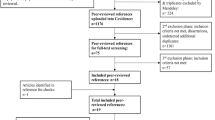Abstract
The majority of adults with serious mental illness living in the community are parents, many of whom may be receiving services from State Mental Health Authorities (SMHA). Innovative intervention approaches are available to improve outcomes for these parents and their children. Analyses of SMHA and state-level data, as well as qualitative interviews of administrators, service providers, and consumers, underscore the importance of organizational structure and philosophy, an advocacy presence, and available funding to SMHA efforts on behalf of parents and their families.
Similar content being viewed by others
REFERENCES
Apfel, R. J., & Handel, M. H. (1993). Madness and loss of motherhood: Sexuality, reproduction, and longterm mental illness. Washington, DC: American Psychiatric Press, Inc.
Australian Infant, Child, Adolescent and Family Mental Health Association. (2003). Principles and actions for services and people working with children of parents with a mental illness. Australia: Children of Parents with a Mental Illness Initiative.
Beardslee, W. R., Keller, M. B., Seifer, R., Podorefsky, D., Staley, J., Lavori, P. W., et al. (1996). Prediction of adolescent affective disorder: Effects of prior parental affective disorders and child psychopathology. Journal of the American Academy of Child and Adolescent Psychiatry, 35(3), 279–288.
Beardslee, W. R., Versage, E., Wright, E., Salt, P., Rothberg, R. C., Drezner, K., et al. (1997a). Examination of preventive interventions for families with depression: Evidence of change. Development and Psychopathology, 9(1), 109–130.
Beardslee, W. R., Wright, E. J., Salt, P., Drezner, K., Gladstone, T. R. G., Versage, E. M., et al. (1997b). Examination of children's responses to two preventive intervention strategies over time. Journal of the American Academy of Child and Adolescent Psychiatry, 36(2), 196–204.
Blanch, A. K., Nicholson, J., & Purcell, J. (1994). Parents with severe mental illness and their children: The need for human services integration. Journal of Mental Health Administration, 21(4), 388–396.
Callahan, D. (1994). Setting mental health priorities: Problems and possibilities. The Milbank Quarterly, 72(3), 451–470.
Caton, C. L., Cournos, F., & Dominquez, B. (1999). Parenting and adjustment in schizophrenia. Psychiatric Services, 50, 232–243.
Downey, G., & Coyne, J. C. (1990). Children of depressed parents: An integrative review. Psychological Bulletin, 108(1), 50–76.
Frank, R. G., & Gaynor, M. (1994). Fiscal decentralization of public mental health care and the Robert Wood Johnson Foundation Program on chronic mental illness. Milbank Quarterly, 72(1), 81–104.
Geller, J. L., Brown, J. M., Fisher, W. H., & Manning, T. D. (1998). A national survey of ''consumer empowerment'' at the state level. Psychiatric Services, 49(4), 498–503.
Hasenfeld, Y. (1983). Human services organizations. Englewood Cliffs, NJ: Prentice-Hall.
Hinden, B., Biebel, K., Nicholson, J., Henry, A., & Stier, L. (2002). Steps towards evidence-based practices for parents with mental illness and their families. Rockville, MD: Center for Mental Health Services, Substance Abuse and Mental Health Services Administration.
Hudson, C. G. (1987). An empirical model of state mental health spending. Social Work Research and Abstracts, 23(1), 3–12.
McGovern, M., Lyons, J., & Pomp, H. (1990). Capitation payment systems and public mental health care: Implications for psychotherapy with the seriously mentally ill. American Journal of Orthopsychiatry, 60(2), 298–304.
Miller, S. O. (1991). Historical perspectives on state mental health policy. In C.G. Hudson & A.J. Cox (Eds.), Dimensions of state mental health policy. New York: Praeger Publishers.
Moore, J., Buchan, B., Finkelstein, N., & Thomas, K. E. (2002). Nurturing families affected by substance abuse, mental illness and trauma. Cambridge, MA: Institute for Health and Recovery.
Mowbray, C. T., Oyserman, D., & Ross, S. R. (1995). Parenting and the significance of children for women with a serious mental illness. Journal of Mental Health Administration, 22(2), 189–200.
Mowbray, C. T., Oyserman, D., Zemencuk, J. K., & Ross, S. R. (1995). Motherhood for women with serious mental illness: Pregnancy, childbirth, and the postpartum period. American Journal of Orthopsychiatry, 65(1), 21–38.
Mowbray, C. T., Schwartz, S., Bybee, D., Spang, J., Rueda-Riedle, A., & Oyserman, D. (2000). Mothers with a mental illness: Stressors and resources for parenting and living. Families in Society, 81(2), 118–129.
National Association of State Mental Health Program Directors Research Institute, Inc. (NRI). (2003). State profile system. Alexandria, VA. Available: www.nri-inc.org.
Nicholson, J. (1996). Services for parents with mental illness and their families. The Journal of the California A.M.I., 7(3), 66–68.
Nicholson, J., Biebel, K., Hinden, B., Henry, A., & Stier, L. (2001). Critical issues for parents with mental illness and their families. Rockville, MD: Center for Mental Health Services, Substance Abuse and Mental Health Services Administration.
Nicholson, J., Biebel, K., Williams, V., & Katz-Leavy, J. (2004). Prevalence of parenthood among adults with severe mental illness. In R.W. Manderscheid and M.J. Henderson (Eds.), Mental health, United States, 2002. Rockville, MD: U.S. Department of Health and Human Services, Substance Abuse and Mental Health Services Administration, Center for Mental Health Services.
Nicholson, J., Geller, J. L., Fisher, W. H., & Dion, G. L. (1993). State policies and programs that address the needs of mentally ill mothers in the public sector. Hospital and Community Psychiatry, 44(5), 484–489.
Nicholson, J., & Henry, A. D. (2003). Achieving the goals of evidenced-based psychiatric rehabilitation practices for mothers with mental illness. Psychiatric Rehabilitation Journal, 27(2), 122–129.
Nicholson, J., Nason, M., Calabresi, A., & Yando, R. (1999). Fathers with severe mental illness: Characteristics and comparisons. American Journal of Orthopsychiatric, 69(1), 134–141.
ORC Macro (2004, April). Aggregate data profile report: Grant communities funded in 1997 and 1998. Unpublished report.
Oyserman, D., Mowbray, C. T., & Zemencuk, J. K. (1994). Resources and supports for mothers with severe mental illness. Health and Social Work, 19(2), 133–142.
Podorefsky, D., McDonald-Dowdell, M., & Beardslee, W. R. (2001). Adaptation of preventive interventions for low-income, culturally diverse community. Journal of the American Academy of Child and Adolescent Psychiatry, 40(8), 879–886.
Quinton, D., Rutter, M., & Liddle, C. (1984). Institutional rearing, parenting difficulties and marital support. Psychological Medicine, 14, 107–124.
Rochefort, D. (1989). Mental illness and mental health policy as public policy concerns. In D. Rochefort (Ed.), Handbook on mental health policy in the United States. New York: Greenwood Press.
Ross, E. C. (2000). Will managed care ever deliver on its promises? Managed care, public policy, and consumers of mental health services. Administration and Policy in Mental Health, 28(1), 7–22.
Scallet, L. J. (1996). Managing care for mental illness: Paradox and pitfalls. Managed Care Quarterly, 4(3), 93–99.
Tannenwald, R. (1999). Fiscal disparity among the states revisited. New England Economic Review, 7-8, 3–25.
Torrey, E. F., & Wolfe, S. M. (1986). Care for the seriously mentally ill: A rating of state programs. Washington, DC: Public Citizens Health Research Group.
VanLeit, B. (1996). Managed mental health care: Reflections in a time of turmoil. American Journal of Occupational Therapy, 50(6), 428–434.
Weinreb, L., & Nicholson, J. (2003) Trauma: Service implications for homeless mothers and children. Presented at CMHS/CSAT Homeless Families Program Steering Committee Meeting, Rockville, MD.
White, C. L., Nicholson, J., Fisher, W. H., & Geller, J. L. (1995). Mothers with severe mental illness caring for children. The Journal of Nervous and Mental Disease, 183(6), 398–403.
Author information
Authors and Affiliations
Corresponding author
Rights and permissions
About this article
Cite this article
Biebel, K., Nicholson, J., Williams, V. et al. The Responsiveness of State Mental Health Authorities to Parents with Mental Illness. Adm Policy Ment Health 32, 31–48 (2004). https://doi.org/10.1023/B:APIH.0000039661.54974.ce
Issue Date:
DOI: https://doi.org/10.1023/B:APIH.0000039661.54974.ce




